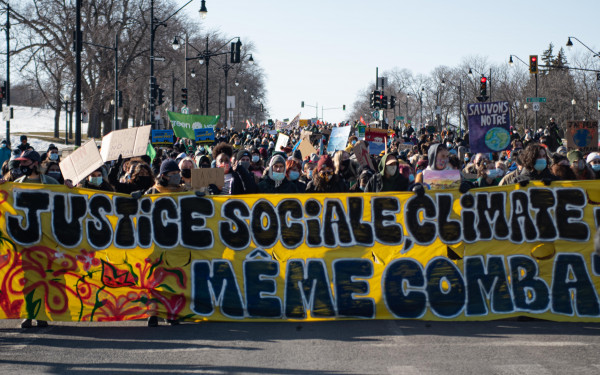“Anger and Disappointment” From Protesters Over Pipeline Approval
Justin Trudeau Steps Back From Promises, Montrealers Step to the Streets
A peaceful demonstration of more than a hundred protesters gathered on Phillips Square last Saturday, Dec. 3. Shouted slogans and singing traditional Indigenous songs, protesters expressed discontentment at Prime Minister Justin Trudeau’s decision to approve the extension of the Kinder Morgan Trans Mountain pipeline in British Columbia.
Concordia sociology graduate Shane Thompson organized the event. He said he was surprised when 5,300 people ended up being invited to participate to the Facebook event.
“Climate justice is the biggest issue of our time”, spokesperson Jed Lenetsky said. Those who gathered showed up to express their anger and disappointment regarding the pipeline, he added.
The Kinder Morgan Trans Mountain pipeline has been carrying crude and refined oil from Alberta to British Columbia since 1953. The expansion project which activists gathered to oppose includes the construction of a parallel pipeline transporting diluted bitumen, a product of tar sands, between Burnaby, B.C. and Edmonton, Alberta. It would almost triple the number of barrels transported per day, from 300,000 to 890,000.
Trudeau also approved the Line 3 project by Enbridge, meant to replace pipeline segments running from Alberta to Wisconsin.
Small groups started gathering on the square around 2:30 p.m. By 3:15 p.m, a crowd had assembled. Even though the sun did not manage to chase away the cold, more than a hundred protesters stayed and cheered.
The protest was organized to be a standing demonstration featuring several speakers either representing themselves or talking for environmental and social associations, according to the Facebook event page. Present was former MP for the New Democratic Party Jamie Nicholls, who came to Montreal from his hometown of Vaudreuil-Soulanges to give a speech and stand in solidarity with the protesters.
“The place I grew up in was unceded, unsurrendered Anishinaabe Algonquin lands,” he said, “just like this square here is on unceded, unsurrendered Kanien’kehá:ka land.” He wanted to remind people, that there is more to the history of Quebec and Canada than just 400 years of colonialism.
Nicholls also brought up how the pipeline process infringes on First Nations sovereignty. “First Nations have not been properly consulted”, Nicholls said, adding that the Canadian government is acting against Article 35 of the Constitution—the duty to first consult First Nations if construction will infringe upon previously agreed treaties.
Nina Segalowitz had come with her daughters, her companion and her niece to sing and stand in solidarity with Indigenous communities. Born in Fort Smith, Northwest Territories, she punctuated the demonstration with two traditional throat songs.
3_900_600_90.jpg)
“I am here to support Mother Earth. I’m here for myself, but mostly for my kids and the generations to come”, said Segalowitz.
“I’m proud they are here,” she said, as she pointed out that her teenage daughter came to play the drums with her. “They’re fighting for their futures as well. With one mind, one heart and one spirit, we can prevent anything from happening.”
Environmental and Social Concerns in the Spotlight
Several speakers brought up environmental concerns regarding pipelines. Previous oil spills from the Kinder Morgan pipeline in 2005, 2007, 2009 and 2012 they feel justify their worries.
A member of the Climate Scorecard, a group of researchers evaluating the top 25 greenhouse-gas-emitting countries worldwide, asked the Canadian population to hold Trudeau’s government accountable for national emissions. Tar sand production, pipelines, and rising emissions are, according to the Scorecard, the number one obstacle to Canada meeting its greenhouse gas emissions requirements as stipulated in the Paris Agreement, which Canada signed and was ratified in October.
“Trudeau said many times that the economy and the environment go hand in hand,” Nicholls recalled. He denounced this contradiction, highlighting that Canadians should start looking at renewable solutions instead of “looking at the old economy of the past”.
“[Trudeau] made promises to the Canadian people. A year later, he has turned 180 degrees away from these,” said Nicholls. He said that delivering those “broken hopes” to Canadians can only “feed cynicism” regarding the government’s environmental platform.
A feeling of deception was the common thread among both protesters and speakers. “[Trudeau] told us a bold lie,” Thompson, the event’s organizer, said. To him, the Prime Minister’s decision to approve two out of three pipelines shows that he failed to be an “environmental leader.”
“It’s not for the people but for the companies,” said demonstrator Aude Mathieu. “Not for the environment’s sake but for the economy. You cannot claim to create jobs while endangering [everyone’s] lives.”
However, there was still a sense of hope at the Square. “There is a common consensus,” Lenetsky continued. “People are going to do whatever’s needed—civil disobedience, lawsuits on the behalf of First Nations—to prevent that pipeline from being built.”

1_900_600_90.jpg)

_600_375_90_s_c1.jpg)

__600_375_90_s_c1.jpg)
1web_600_375_90_s_c1.jpg)